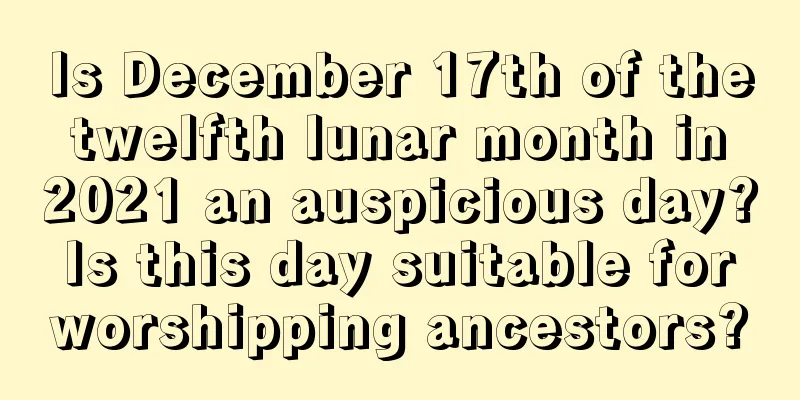Do you only know how to drink Laba porridge on Laba Festival? Learn about the origin of Laba Festival

When we mention Laba Festival, most of us think of seasonal delicacies such as Laba porridge and Laba garlic. Many people also know that this is a traditional festival from Buddhism. If we look back at the history of Laba Festival, we will find that the history and cultural connotations of this festival are more than that. The editor will now introduce it to you in detail! The twelfth month of the lunar calendar is commonly known as "La Yue" among the people. If you want to know more about the twelfth month of the lunar calendar in 2019, please visit Mr. Shui Mo’s website!The Origin of Laba FestivalLari as a festival for worshipping began in the pre-Qin period. In the early days, the ancient Chinese celebrated the "Lari" festival on the eighth day of the twelfth lunar month. In the "Jingchu Sui Shi Ji" by Liang Zonghuan of the Southern Dynasty, it is stated: "The eighth day of the twelfth month is the La Day." The La Day is a festival for sacrificial offerings, which was formed in the pre-Qin period. There is a record in "Records of the Grand Historian: The Basic Annals of Qin": "The twelfth year, the first La Festival." This means that in the twelfth year of King Huiwen of Qin, the western Qin State imitated the customs of the Central Plains and held the La Festival for the first time. The La Festival was regarded as the beginning of the year by the ancients . <br /> Because it was a day for sacrifice, the ancients who feared the gods attached great importance to the La Festival. On the eighth day of the first lunar month, the ancients would hold many activities, such as hunting, garden tours, etc. So how did the ancients come up with the idea of celebrating the Lari Festival? This has to start with the "October Calendar" used by ancient people. Sima Qian's "Records of the Grand Historian - Book of Celestial Officials" records: "When predicting the good or bad years, one must carefully wait for the beginning of the year. The beginning of the year is on the winter solstice, when the energy of production begins to sprout. The day after the twelfth lunar month, people end the year, eat and drink together, and the yang energy is released, so it is called the beginning of the year." The general meaning of this sentence is that when predicting the good or bad harvest of a year, one must be cautious in predicting the beginning of the year. The beginning of the year may be the winter solstice, when vitality begins to emerge; or it may be the day before the twelfth lunar month, when people gather together for a meal to stimulate yang energy after a year, so it is called the beginning of the year. The "La Mingri" here refers to the first day of the first month in the "October calendar", that is, New Year's Day, also known as "Zhengsui" and "Lasui", which is equivalent to the modern lunar New Year. It is precisely because the ancients had the custom of celebrating the New Year on the "La Ming Day" that there is the phenomenon of "people eating and drinking together at the end of the year". Why is it said that Laba Festival is the New Year?The eighth day of the twelfth lunar month is the traditional Chinese "Laba Festival". Folk scholars say that Laba originated from the ancient custom of worshiping gods and praying for a good harvest. As its theme is similar to the Spring Festival and its time is close to the Spring Festival, there is a saying that "after Laba it is the New Year." (1) Folklorists point out that in ancient China, people called the winter sacrifice to gods and ancestors "Dala", and the day for the winter sacrifice was called "La Day". The specific time of "La Day" has changed several times. During the Southern and Northern Dynasties, the eighth day of the twelfth lunar month was gradually determined as "La Day". For example, in "Jingchu Sui Shi Ji" written in the 6th century AD, there is a record that "December 8th is La Day". (2) Folklore scholars also pointed out that in addition to sacrificial offerings, the traditional Laba customs of exorcising diseases and evil spirits also coincide with the theme of the Spring Festival, which is to bid farewell to the old and usher in the new. For example, in "Zhou Li", there are records about the "Danuo" ceremony held on Laba Festival. Later, with the development of the times, the above rituals gradually became secularized and evolved into folk customs such as "beating the night beard" and "jumping the kitchen god", and have been preserved in some areas to this day. (3) In addition, as a traditional Chinese festival, the spread of Laba is closely related to Buddhism. According to scholars, after the Han Dynasty, with the introduction of Buddhism, people gradually attributed Laba to the "day of enlightenment and becoming a Buddha" of Buddha Shakyamuni. Even "Laba porridge" is called "Buddha porridge" in some places. The ingredients such as glutinous rice, red beans, dates, purple rice, and walnut kernels symbolize the Eighteen Arhats. (4) Scholars believe that the popularity of Laba Festival among the people is closely related to the traditional Chinese values of the blend of Confucianism, Buddhism and Taoism. It also reflects the people’s simple desire for family reunion, happiness and peace, which coincides with the theme of the Spring Festival. Nowadays, with the faster pace of life, the festive atmosphere has faded relatively, but as the Spring Festival is approaching, most families begin to prepare for the New Year after Laba. Among the folks, there is a saying that "drink Laba porridge for a few days, and it will be the twenty-third day of the twelfth lunar month". After the Little New Year on the twenty-third day of the twelfth lunar month, it is completely "Spring Festival time". |
Recommend
Is it okay to travel far away the day before Grain in Ear in 2020? Has Grain in Ear entered the plum rain season?
Introduction: The arrival of the Grain in Ear sola...
The origin of the Dragon Raising Head Festival on February 2, 2020, the Year of the Rat
What is the origin of the Dragon Raising its Head ...
Do I have to go home for the Dragon Boat Festival? Will the expressway be free during the Dragon Boat Festival?
The Dragon Boat Festival is approaching, and many ...
A complete analysis of the fate of people born in the year of the horse during the Great Cold solar term
The fate of people born in the Great Cold period u...
Can I sign a contract on March 19, 2019?
When signing a contract, not only should the parti...
Is it a good idea to get a haircut on May 31st, the day before Children's Day in 2020? What is the appropriate age to celebrate Children's Day?
Introduction: Sometimes you have to choose an ausp...
Where is the direction of the God of Happiness on April 26, 2019 in the lunar calendar?
April is the most beautiful month in the world. A...
There are three treasures in the home. The three great Feng Shui treasures for gathering wealth are here.
Introduction: Home is where a family lives togeth...
People born in the Grain Rain season in 1995 under the Pig sign have good personalities. Check their fate!
Grain Rain Season: The cold wave weather is basica...
Is the seventh day of the ninth lunar month in 2020 an auspicious day in the lunar calendar?
Is the seventh day of the ninth lunar month in 20...
What constellation is born on August 23rd of the lunar calendar in 2022, and what lucky items are there?
Each zodiac sign has its own unique side, and the ...
What is the zodiac sign of a child born on July 12, 2020 in the lunar calendar? How is fate?
There is a certain relationship between a child’s ...
How will the fortune of people born in the Year of the Snake be after the Lesser Heat in 2022? Is it going well?
Fortunes will change as you wish at different time...
Wouldn’t it be a good idea to get the marriage certificate on May 6, one day after the beginning of summer in 2020? Will there be thunder on the beginning of summer in 2020?
Introduction: It is very necessary to choose an au...
How about the lunar October 20th, 2018? Is it a good day?
Shui Mo Xiansheng website has carefully compiled ...









